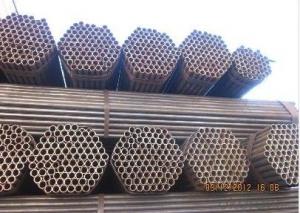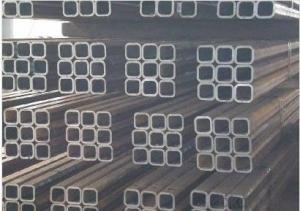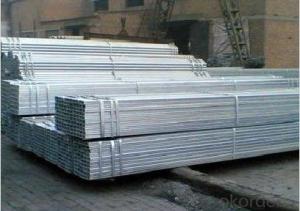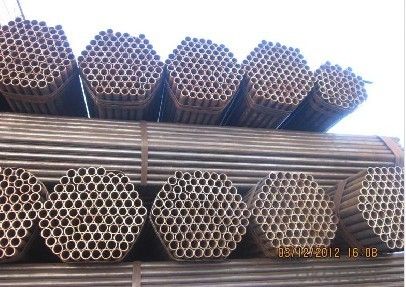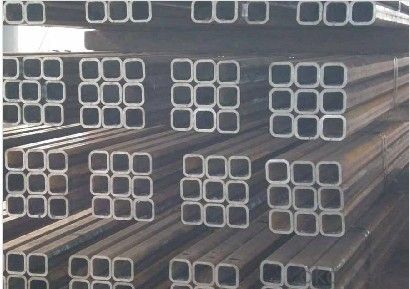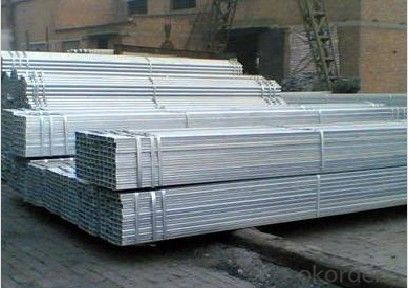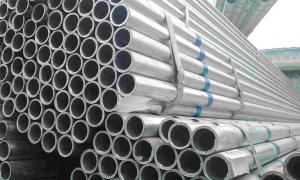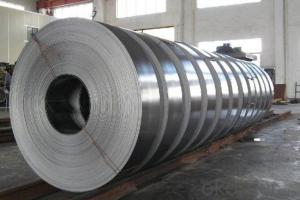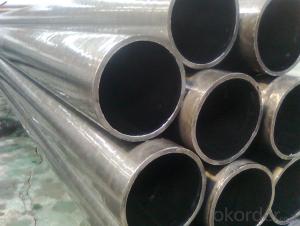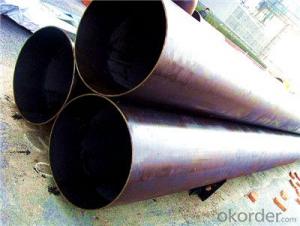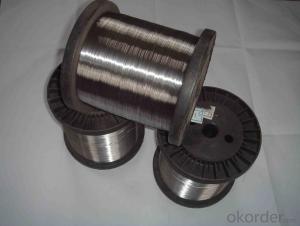API High Pressure Alloy Steel Pipe from cnbm
- Loading Port:
- Tianjin
- Payment Terms:
- TT or LC
- Min Order Qty:
- 50 m.t.
- Supply Capability:
- 20000 m.t./month
OKorder Service Pledge
OKorder Financial Service
You Might Also Like
1、Structure of API High Pressure Alloy Steel Pipe:
Seamless pipe is formed by drawing a solid billet over a piercing rod to create the hollow shell. As the manufacturing process does not include any welding, seamless pipes are perceived to be stronger and more reliable. Historically seamless pipe was regarded as withstanding pressure better than other types, and was often more easily available than welded pipe.
2、Main Features of API High Pressure Alloy Steel Pipe:
• High manufacturing accuracy
• High strength
• Small inertia resistance
• Strong heat dissipation ability
• Good visual effect
• Reasonable price
3、API High Pressure Alloy Steel Pipe Specification:
Standard | GB, DIN, ASTM ASTM A106-2006, ASTM A53-2007 |
Grade | 10#-45#, 16Mn 10#, 20#, 45#, 16Mn |
Thickness | 8 - 33 mm |
Section Shape | Round |
Outer Diameter | 133 - 219 mm |
Place of Origin | Shandong, China (Mainland) |
Secondary Or Not | Non-secondary |
Application | Hydraulic Pipe |
Technique | Cold Drawn |
Certification | API |
Surface Treatment | factory state or painted black |
Special Pipe | API Pipe |
Alloy Or Not | Non-alloy |
Length | 5-12M |
Outer Diameter | 21.3-610mm |
Grade | 20#, 45#, Q345, API J55, API K55, API L80, API N80, API P110, A53B |
Standard | ASME, ASTM |
1) Material:20#(ASTM A 106/A53 GRB.API5LGRB,GB),45#,16Mn,10#.
2) Specification range:OD:21.3-610mm,WT:6-70mm,length:6-12m or according to the requirement of clients.
3) Excutive standards:GB,ASME API5L.ASTM A 106/A53,Despite of the above standards,we can also supply seamless steel pipe with standard of DIN,JIS,and so on,and also develop new products according to the requirements of our clients!
4) Surface:black lacquered,varnish coating or galvanized.
5) Ends:Beveled or square cut,plastic capped,painted.
6) Packing:bundles wrapped with strong steel strip,seaworthy packing.
4、Packaging & Delivery
Packaging Details: | seaworthy package,bundles wrapped with strong steel strip |
Delivery Detail: | 15-30days after received 30%TT |
5、FAQ of API High Pressure Alloy Steel Pipe:
①How is the quality of your products?
Our products are manufactured strictly according to national and internaional standard, and we take a test
on every pipe before delivered out. If you want see our quality certifications and all kinds of testing report, please just ask us for it.
Guaranteed: If products’ quality don’t accord to discription as we give or the promise before you place order, we promise 100% refund.
②How about price?
Yes, we are factory and be able to give you lowest price below market one, and we have a policy that “ for saving time and absolutely honest business attitude, we quote as lowest as possible for any customer, and discount can be given according to quantity”,if you like bargain and factory price is not low enough as you think, just don’t waste your time.Please trust the quotation we would give you, it is professional one.
③Why should you chose us?
Chose happens because of quality, then price, We can give you both.Additionally, we can also offer professional products inquiry, products knowledge train(for agents), smooth goods delivery, exellent customer solution proposals.Our service formula: good quality+good price+good service=customer’s trust
SGS test is available, customer inspection before shipping is welcome, third party inspection is no problem.
6、API High Pressure Alloy Steel Pipe Images:
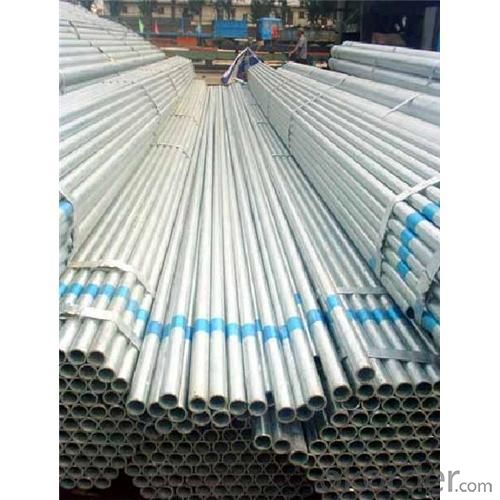
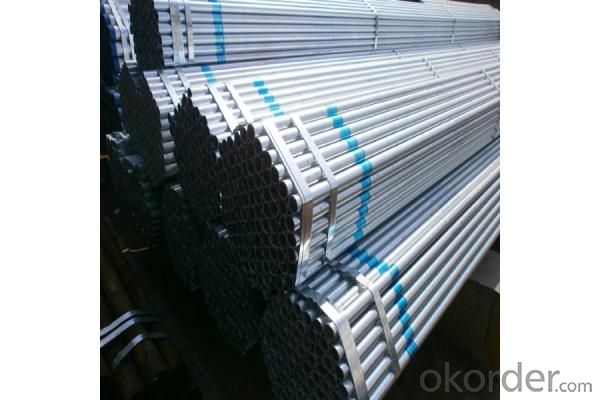
- Q: What are the common uses of stainless steel pipes?
- Stainless steel pipes are widely used in various industries for a multitude of applications. Some of the common uses of stainless steel pipes include: 1. Plumbing and Water Supply: Stainless steel pipes are often used in residential, commercial, and industrial plumbing systems due to their corrosion resistance, durability, and ability to handle high-pressure applications. They are also used in water treatment plants and wastewater management systems. 2. Oil and Gas Industry: Stainless steel pipes are extensively used in the oil and gas industry for transporting oil, gas, and other fluids. They can withstand high temperatures, pressure, and corrosive environments, making them ideal for this industry. 3. Food and Beverage Industry: Stainless steel pipes are widely used in the food and beverage industry due to their hygienic properties and resistance to corrosion. They are commonly used for transporting liquids, gases, and food products in processing plants, breweries, wineries, dairies, and other food-related facilities. 4. Chemical and Petrochemical Industry: Stainless steel pipes are critical in the chemical and petrochemical industry, where they are used for transporting corrosive chemicals, acids, and other hazardous substances. The pipes' resistance to corrosion and high temperatures makes them suitable for these demanding applications. 5. Construction and Architecture: Stainless steel pipes are used in construction and architecture for various purposes such as structural support, handrails, guardrails, and decorative elements. Their strength, durability, and aesthetic appeal make them a popular choice in modern architectural designs. 6. Automotive and Transportation: Stainless steel pipes are used in the automotive industry for exhaust systems, fuel lines, and other components that require resistance to high temperatures and corrosion. They are also used in the transportation of fluids and gases in ships, trains, and airplanes. 7. Pharmaceutical Industry: The pharmaceutical industry requires high-quality materials that meet stringent sanitary standards. Stainless steel pipes are commonly used in pharmaceutical manufacturing processes for transporting liquids, gases, and chemicals due to their cleanability, corrosion resistance, and compatibility with pharmaceutical products. 8. Power Generation: Stainless steel pipes are used in power plants, both conventional and renewable, for various applications such as steam lines, condensers, and heat exchangers. They are chosen for their ability to withstand high temperatures, pressure, and corrosive environments. In summary, stainless steel pipes find applications in a wide range of industries including plumbing, oil and gas, food and beverage, chemical and petrochemical, construction, automotive, pharmaceutical, and power generation. Their corrosion resistance, durability, and ability to handle high temperatures and pressure make them a versatile and reliable choice for various industrial applications.
- Q: What are the different methods of repairing damaged steel pipes?
- There are several methods for repairing damaged steel pipes, including welding, epoxy coatings, pipe wrapping, and pipe lining. Welding involves fusing the damaged sections of the pipe using heat and specialized equipment. Epoxy coatings are applied to the damaged area to create a protective layer and restore the pipe's integrity. Pipe wrapping involves applying specialized tapes or wraps around the damaged area to provide structural support. Pipe lining involves inserting a new pipe into the damaged one, creating a seamless and durable solution. The appropriate method depends on the extent and location of the damage, as well as other factors such as cost and time constraints.
- Q: ASME seamless tube how to express, what is the form, I did not find on the ASME, thank God!
- Seamless steel pipe, welded steel pipe, then its means of expression is: nominal diameter refers to the outer diameter (diameter * wall thickness), the unit is mm. [for example, seamless steel tubes of phi 32 * 3. It means that the nominal diameter (outside diameter) is seamless steel pipe of phi 32mm and wall thickness 3mm.
- Q: How do you determine the pipe schedule for steel pipes?
- The pipe schedule for steel pipes is determined based on various factors such as the pipe's nominal size, wall thickness, and the application requirements. The pipe schedule is a standardized system that indicates the thickness of the pipe's wall, which affects its pressure rating and suitability for different applications. Factors like the fluid type, temperature, and pressure it will be subjected to help determine the appropriate pipe schedule to ensure safe and efficient operation.
- Q: Are steel pipes suitable for underground irrigation pumping?
- Yes, steel pipes are suitable for underground irrigation pumping. Steel pipes are known for their durability and strength, making them an ideal choice for underground applications. They can withstand high levels of pressure, resist corrosion, and are less likely to be affected by external factors such as soil movement or temperature changes. Additionally, steel pipes have a longer lifespan compared to other materials, reducing the need for frequent replacements. However, it is important to ensure that the steel pipes are properly coated or lined to prevent corrosion and to regularly inspect and maintain them to ensure their effectiveness and longevity.
- Q: Is hot dipped plastic pipe steel?
- The hot dipped plastic steel pipe is a steel pipe, and it is made of special antiseptic treated composite steel pipe.
- Q: How are steel pipes protected against UV radiation?
- Steel pipes are typically protected against UV radiation through the application of specialized coatings or paints that contain UV inhibitors. These coatings form a barrier between the steel surface and the sun's UV rays, preventing degradation, discoloration, and potential structural damage caused by prolonged exposure to UV radiation.
- Q: Can steel pipes be used for underground power transmission?
- Yes, steel pipes can be used for underground power transmission. Steel pipes are commonly used in underground power transmission systems due to their durability, strength, and resistance to corrosion. They provide a protective casing for the power cables, ensuring their safety and preventing damage from external factors such as moisture, soil movements, and potential impacts. Steel pipes also allow for easy installation, maintenance, and repair of the power transmission system. Additionally, their ability to withstand high pressure and temperature makes them suitable for carrying the high voltage electricity required for power transmission. Overall, steel pipes are a reliable and efficient choice for underground power transmission.
- Q: What are the different types of steel pipe supports for offshore platforms?
- There are several types of steel pipe supports commonly used for offshore platforms, including but not limited to: 1. Clamps: These are used to secure and fasten pipes to the support structure, providing stability and preventing movement. 2. Hangers: These are used to suspend pipes from the support structure, allowing for flexibility and reducing stress on the pipes. 3. Guides: These are installed to control the movement and alignment of pipes, ensuring they stay in place and prevent damage during operation. 4. Shoes: These are used to support and distribute the weight of the pipe, typically at points where the pipe intersects with the support structure. 5. Saddles: These are designed to cradle the pipe and provide support, typically used for horizontal or inclined pipes. Each type of steel pipe support serves a specific purpose in ensuring the integrity and functionality of the offshore platform's piping system.
- Q: What is the difference between steel pipes and ductile iron pipes?
- Steel pipes and ductile iron pipes are both commonly used for various applications in the construction industry, but they differ in their composition and properties. Steel pipes are primarily made from an alloy of iron and carbon, with small amounts of other elements. They are known for their high tensile strength and durability, making them suitable for transporting fluids and gases under high pressure. Steel pipes are more resistant to corrosion than ductile iron pipes, and they can withstand extreme temperatures and environmental conditions. On the other hand, ductile iron pipes are made from an alloy of iron, carbon, and small amounts of other elements like silicon and magnesium. These pipes are characterized by their high strength, impact resistance, and flexibility. Ductile iron pipes are often used for water and sewage transportation due to their corrosion resistance and ability to withstand ground movement and heavy loads. In summary, steel pipes are known for their strength, durability, and corrosion resistance, while ductile iron pipes offer greater flexibility and impact resistance. The choice between the two depends on the specific application requirements and environmental conditions.
Send your message to us
API High Pressure Alloy Steel Pipe from cnbm
- Loading Port:
- Tianjin
- Payment Terms:
- TT or LC
- Min Order Qty:
- 50 m.t.
- Supply Capability:
- 20000 m.t./month
OKorder Service Pledge
OKorder Financial Service
Similar products
Hot products
Hot Searches
Related keywords
